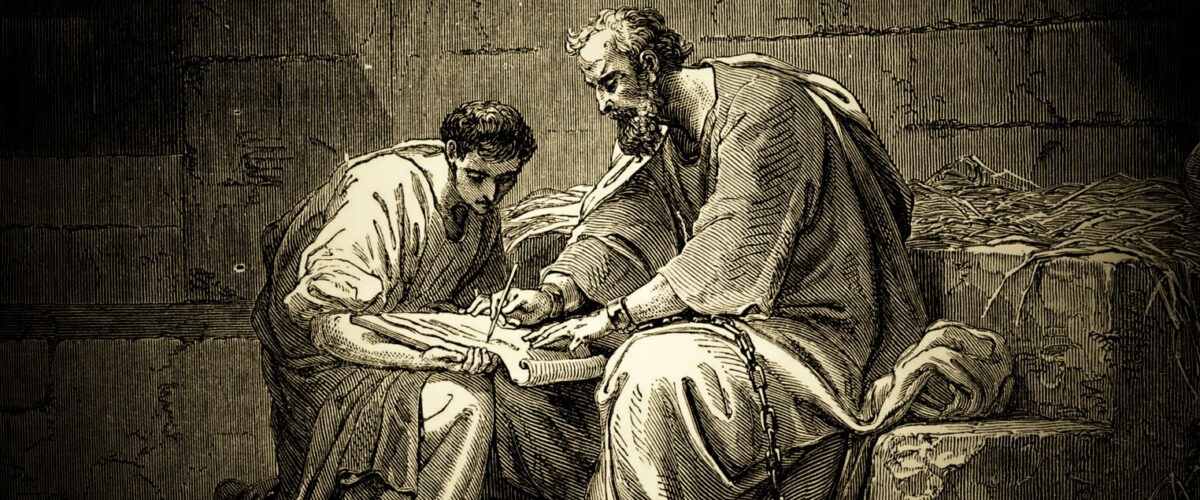Leave it the Apostle Paul to make a prison cell sound like a spiritual oasis. Throughout much of the New Testament, he’s trapped, you know, imprisoned by the Roman Empire for preaching the gospel of Jesus Christ.
Time and again, we find him joyfully longing for a community he dearly loves and writing to them with tender compassion.
At this Christmas season, we might wisely ask: What kind of joy is this? What kind of peace is this that Paul has that enables him to pen epistles while his life and freedom hang in the balance? I understand the “Joy to the World” kind of joy — you know, “joy to the world … the Lord has come!” But our friend Paul seems to know about a different kind of joy — “joy to the world … the Lord is near.”
Near? As in not yet here?

Jenna Sullivan
Is this joy on sale this Christmas, and could I get it with my Nordstrom credit card? Is it a joy I can find in my string of twinkling lights or in my cup of hot cocoa? Is it a joy that can calm my existential anxiety even better than a Netflix romantic comedy? That is a tall order!
Is it a joy that can make me know everything will be OK? Is it the same joy that shines on Santa’s face at the mall? Oh wait, I mean, virtual Santa since we are also in a national shortage of Santas. Could this joy fix that problem too?
Is it a joy that can somehow distract me from the scary word “variant,” and does this joy come with a gift receipt and 30-day return policy in case I’m not pleased with my purchase?
We long for real joy, for real peace. If only a sequined sweater and a jazzy Christmas number could make the fear go away for good. Instead, these days we are just our same scared baby selves with shinier outfits on.
But Paul is on to something with this real joy. His joy is not based on circumstances. How strange. I mean, the man is literally sitting in prison and sounding happy as a clam! Even though he is imprisoned, he is free in spirit. Free to be joyful. Free to still hope.
Poet Richard Lovelace wrote in the 1600s:
Stone walls do not a prison make,
Nor iron bars a cage;
Minds innocent and quiet take
That for an hermitage.
If I have freedom in my love,
And in my soul am free,
Angels alone that soar above,
Enjoy such liberty.
To have freedom in our love. Maybe this makes peace possible. Can we be free in our love?
Paul was. His love for Christ and his love for the early churches gave him the freedom to sound more joyful than drummers drumming or lords a leaping or pipers piping. His joy was made possible because he had received the peace of God.
“It turns out that peace and joy are intricately connected.”
It turns out that peace and joy are intricately connected. Paul was open to simply being with God in the present moment, whatever the circumstances. With God nearby, anything was bearable. This peace was the kind he longed to share with his community, his flock, who needed such a peaceful joy too.
Paul describes the Lord as not far off. It seems that God is near enough to hear his every prayer request and supplication. In Philippians, the apostle makes it sound so simple: “Do not worry about anything.”
It’s as if he’s never sat in holiday shopping traffic during rush hour or watched the evening news. And to be fair, he hasn’t. The modern world we live in does seem to trap us. And it traps some much more than others.
Maybe for us peace is something like the way Maya Angelou describes the song of the caged bird in her majestic poem:
The caged bird sings
with a fearful trill
of things unknown
but longed for still.
Longed for still. Maybe Advent is all about longing for things unknown. Longing for a world in which no one knows the pain of iron bars, physical or otherwise. Longing for all of creation … liberated.
This doesn’t just mean that God’s peace transcends our ability to grasp it. It means that God’s peace is better than, superior to, our human understanding.
“Understanding wasn’t a good gift worth sharing. But peace — peace could do all that and more.”
And this is something entirely different. Paul knew that understanding could not make his prison cell any less lonely. Understanding could not hold his hand through another night. Understanding could not save his life. Understanding could not lull him to sleep. Understanding could not interrupt the agonizing regret that kept him up at night, and understanding did not pardon his sins. Understanding wasn’t a good gift worth sharing.
But peace — peace could do all that and more. God’s peace doesn’t need anything at all. It doesn’t need answers or certainty. It doesn’t need data or logic or information. Peace isn’t trying to get anywhere or do anything or accomplish something.
Peace couldn’t get Paul out of jail, but peace could hold his hand. Peace could lull him back to sleep. Peace was better than understanding.
This Christmas, more information won’t give us true rest from the existential angst we feel about our present situation. A pandemic is still scary as hell even if you understand it. But peace — that will get us through. Peace will connect us to one another.
Peace is experienced together; understanding is pursued alone. Peace is a gift we share with the world. It restores communities and reconciles enemies. It is God’s peace that will steady our trembling hands so that those hands can actually be of good service to the common good.
Jenna Sullivan currently serves as a pastoral resident at Wilshire Baptist Church in Dallas. A native of Little Rock, Ark., she is a graduate of Rhodes College and Wake Forest University School of Divinity.
Related articles:
Joseph, did you know? A reflection on fatherhood during Advent | Opinion by Darrell Hamilton II
Seeking the Prince of Peace in a nation overwhelmed by threats | Opinion by Bill Leonard
What The Little Prince taught me about Christmas | Opinion by Phawnda Moore


